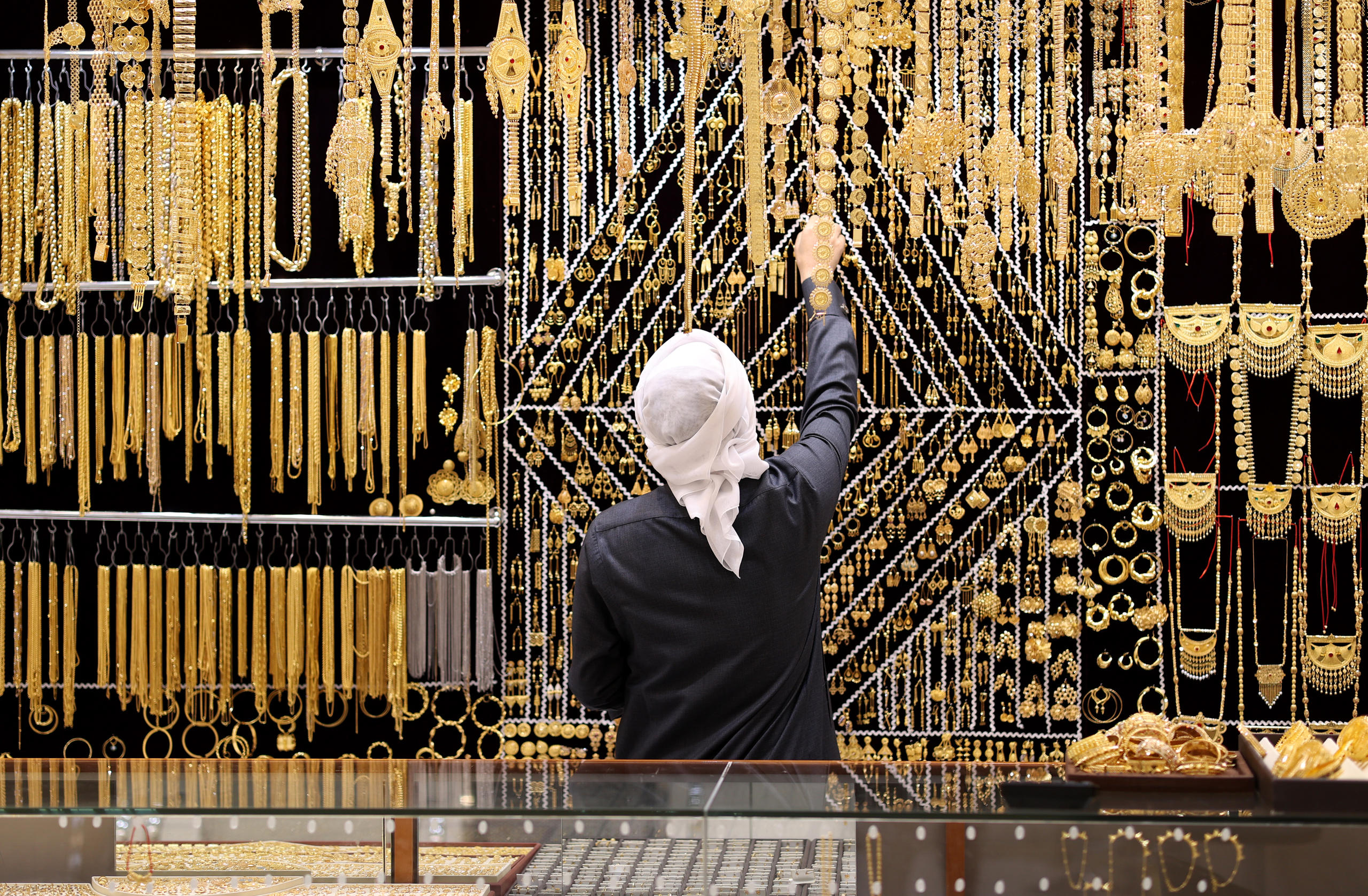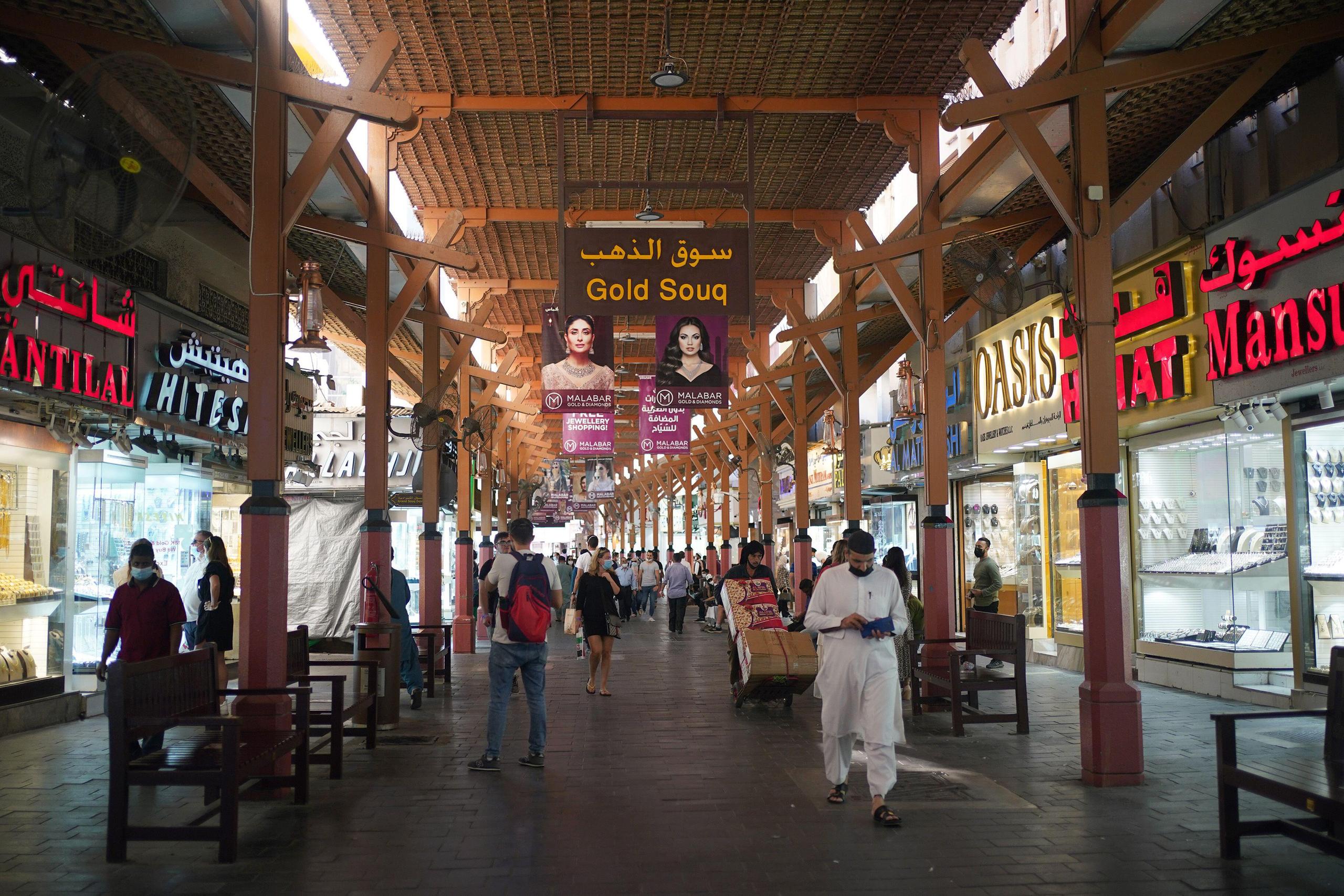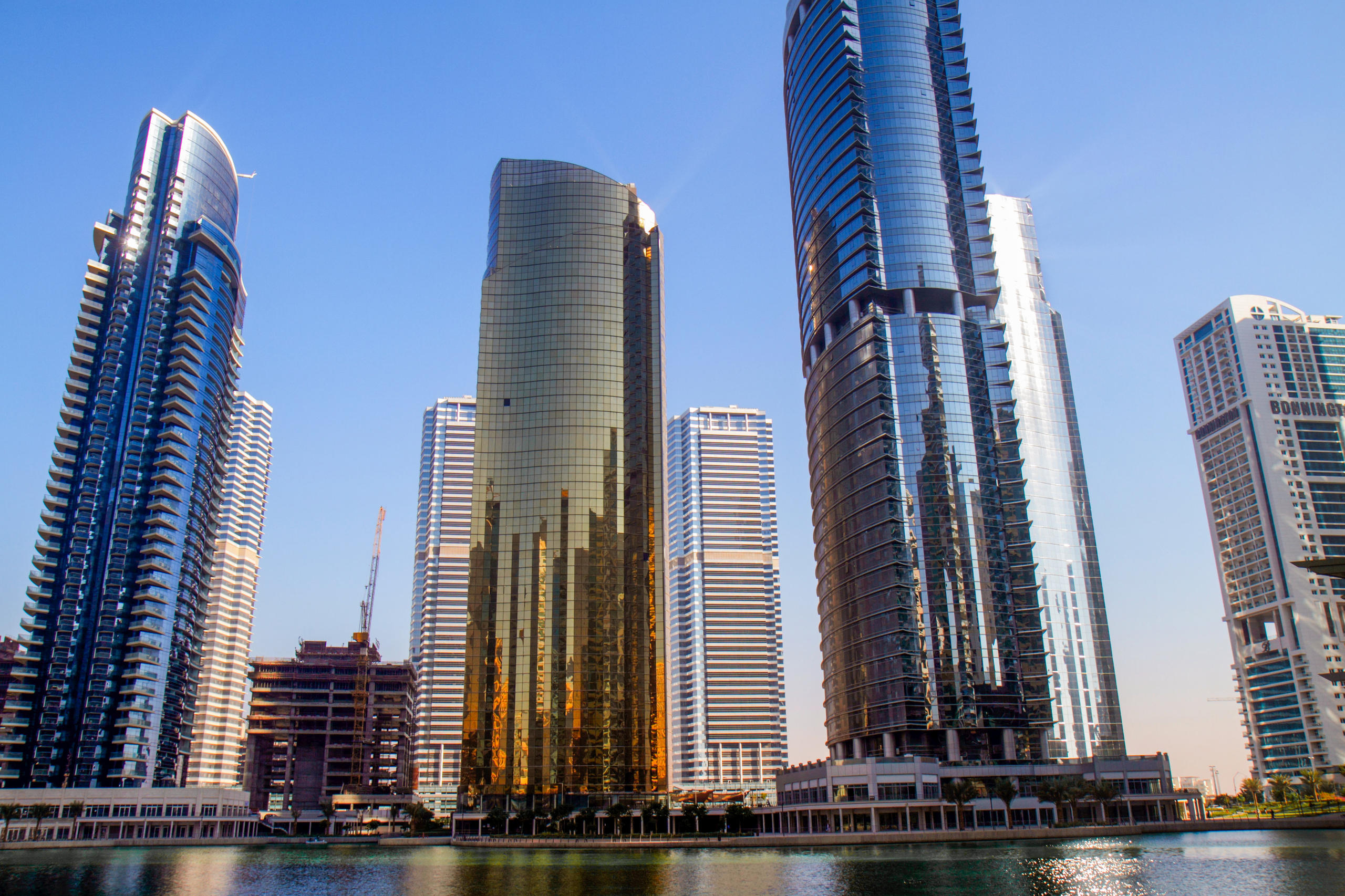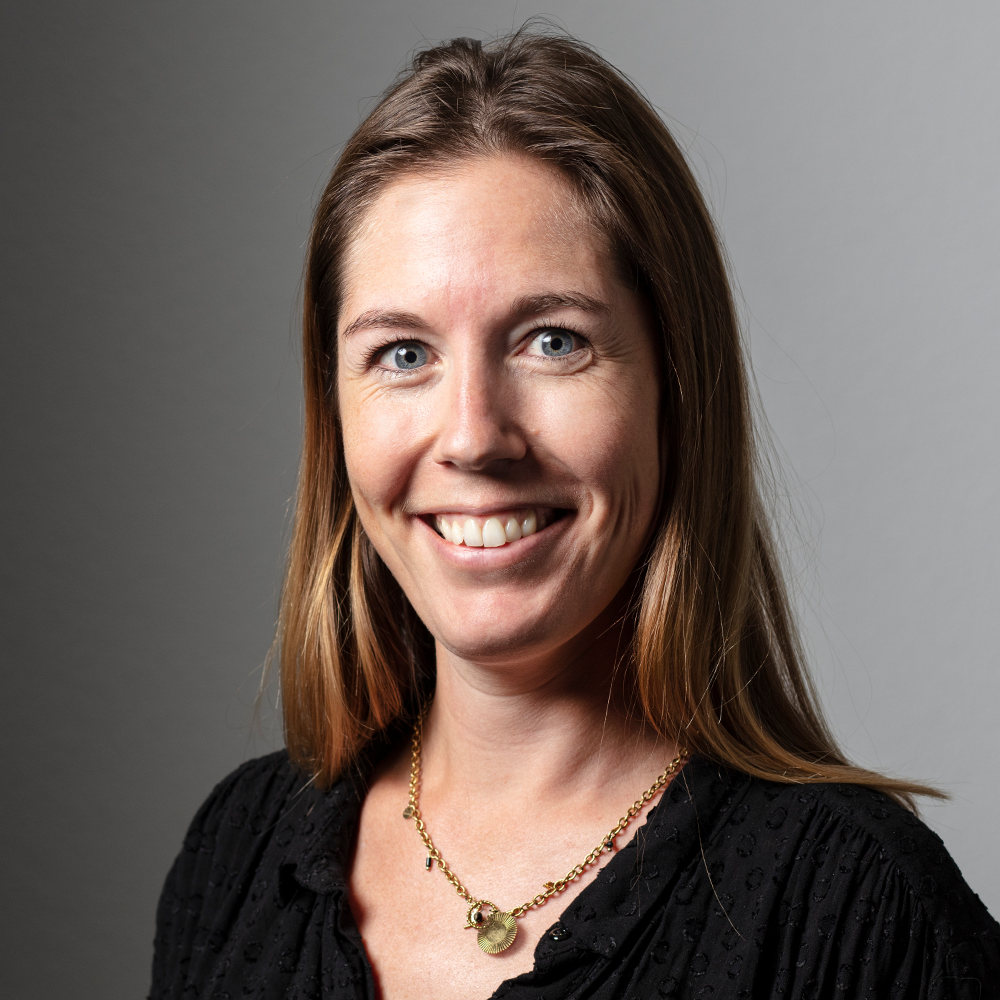Gold: Can the UAE outshine Switzerland?

Gold is everywhere in Dubai. It glitters in the shop windows of its historic Old Souk while sparkling skyscrapers pay homage to this and other precious metals in the desert city’s ultra-modern skyline. A gold, diamond-crusted tower is in the works. In contrast to discretion-driven Switzerland, the United Arab Emirates proclaims its new-found status as a major gold hub ostentatiously.
Switzerland sits at the heart of Europe and has for decades been the dominant player in the global gold industry both in terms of refining capacity and trading. But the UAE, which lies at the crossroads of the West and an increasingly affluent East, is threatening that supremacy, having built its position quietly over the past two decades. These dramatically different worlds are intertwined yet also increasingly competitive.
Covid-19 followed by the wars in Ukraine and Gaza have accelerated a structural trend in the works since Donald Trump came into office as President of the United States in 2017: that of redefining globalisation as we have experienced it over the past three decades. On the one hand Western countries weary of the negative effects of open trade policies are resorting to populist and more protectionist measures embracing among others an anti-China discourse. On the other what is referred to as the Global South, want another type of globalisation with their interests at the centre.
These shifts are affecting foreign policies, trade, investment and how global companies position themselves in an increasingly divided world against the backdrop of slowing growth in China.
These include Switzerland’s many multinational companies which benefit from sourcing raw materials from across the globe and sell worldwide. They are dependent on stable commodity prices, fluid supply chains and open markets.
In this series we look at how this geopolitical landscape is impacting Switzerland’s largest global companies. Topics covered include: how China still fares well for some niche high-end consumer goods, reshoring the pharmaceutical industry to Europe, can India be the next China and what a more inclusive globalisation could look like.
The UAE, particularly Dubai, is on the rise as an international gold hub. Since 2012, it has leveraged its strategic location, modern infrastructure, and business-friendly policies to attract global players. While Switzerland offers a well-established financial system and an orderly, regulated market, the UAE provides a dynamic and forward-looking environment with a strong emphasis on innovation – innovation in architecture, digital technology and the business environment. Sanctions on Russia over its war against Ukraine have also helped shift global gold trading to Dubai and Hong Kong.

How much of a threat is the UAE to Switzerland? “It depends on how you look at the gold sector and the roles that the countries play,” says Australia-based gold expert Marcena Hunter. “The UAE is already a major gold transit hub. Dubai already imports and exports significant amounts of gold, including to Switzerland. In some ways, you can argue that Dubai is already bigger than Switzerland, especially in relation to [gold imports from] artisanal and small-scale mining.”
The Swiss tend to stick to sourcing gold from industrial mines across the world. The UAE, on the other hand, snaps up gold from artisanal small-scale operations in sub-Saharan-Africa, Latin America and South Asia. Switzerland has consistently been the world’s leading gold importing and exporting country in value terms, but the UAE’s growing share means it’s now among the top five.
The Alpine nation remains the pre-eminent choice for those seeking precision and reliability in gold transactions. Swiss banks and refiners trumpet their adherence to strict regulations and are increasingly putting emphasis on ethical sourcing. Members of the Swiss Association of Precious Metals Manufacturers and Traders even stopped sourcing gold from Dubai. Last year Valcambi, the country’s largest refinery, decided to resign from the association arguing “irreconcilable differences”. The association coordinates communication and lobbying on behalf of the Swiss gold sector and takes pride in its code of conduct.
+ The dark secrets of Valcambi, Switzerland’s largest refinery
Rising gold hub
The Financial Action Task Force (FATF), the global money laundering and terrorist financing watchdog, formally identified the UAE in June 2022 as a jurisdiction subject to increased monitoring due to perceived deficiencies in the effectiveness of its efforts to counter money laundering and the financing of terrorism. Problematic transactions in the gold sector were a major reason for its decision to add the country to its grey list.
“Dubai is an important market and international precious metal business hub,” says Christoph Wild, former CEO of Swiss refinery Argor-Heraeus and president of the Swiss Association of Manufacturers and Traders of Precious Metals. “It will be even more important in the future,” he said, pointing to its strategic location, rapid infrastructure development and business-friendly environment along with the potential for growth in financial services.
“They [the UAE] are taking good steps towards more sustainability and transparency,” he said. “That’s the right way to go. But time is not mature now to close our eyes and take all material coming from Dubai.”
It has been established that a large amount of gold transiting through Dubai comes from Africa and from illegal, criminal, conflict zones, Wild says. “We all know that when gold is melted together you lose the identity. If we are not clear on where the gold comes from then don’t touch it. That’s not to say that all players in the UAE are bad. There are good players, bad players, and crystal-clear players when it comes to due diligence.”
Others point out that while the UAE remains a destination for unlicensed gold mining, it has been taking steps to strengthen its regulatory regime. “There are other places that are used in the same way; or abused,” notes Hunter, who is the thematic lead on extractives at the Global Initiative Against Transnational Organized Crime, a civil society organisation focused on illicit economies. “We are seeing indications that other destinations are increasingly exploited to launder gold. Also, markets such as Switzerland or the UK are not necessarily clean or guilt-free as long as they continue to import large amounts of gold from jurisdictions where gold is known to be laundered.”
Indeed, the UAE’s main export to Switzerland is gold. Shipments from the Arab nation amounted to CHF7.9 billion ($9.16 billion) in 2022, according to the Federal Office for Customs and Border Security. Problematic gold – be it from Africa’s conflict zones or dodgers of Western sanctions on Russia – can easily flow to Switzerland via the UAE, according to experts.
Trade data show Russia and Mali were the two top sources of UAE gold imports in 2022 in terms of volume and value. Russia was the noteworthy newcomer, a result of sanctions imposed after its invasion of Ukraine curtailed exports to Western markets. Local armed groups in several conflict-hit regions of Africa have used the gold trade to finance their activities for decades. The security concern for Western nations are players like Al-Qaeda and the Islamic State and Russia’s mercenary Wagner group.
Cleaning up?
Dubai hosted its 11th annual Precious Metals Conference in November. The event, born out of the global financial crisis in 2008, drew a wide array of gold industry players, from regulators and experts, to bankers, traders, refiners, and even sanctioned individuals including Alain Goetz, who was punished by the European Union for dealing in conflict gold from the Democratic Republic of Congo.
In contrast to Western conferences, Russians came in high enough numbers to warrant their own table and discussed headaches such as export tariffs and sanctions with existing and potential partners in China. While presenters talked due diligence, a pair of delegates from Siberia wondered if their request to publicly present a falcon carved from mammoth marble to the host would be accepted. Others sought to sell Sudanese gold, which has also been linked to conflict finance.
The event portrayed Dubai as the heart of an intensifying gold trade that is increasingly shifting east.
“We cannot ignore the fact that central banks accumulated gold at the fastest pace on record in the first two months of 2023, totaling 125 tonnes,” DMCC Chairman Ahmed Bin Sulayem said in his welcome remarks to the conference. “From India to Russia, central banks collectively bought 800 tonnes over the past 12 months – up 14% on the previous year. And all signs show we should expect another colossal year of gold buying in 2024, with increased volatility, ongoing inflation, and de-dollarisation in global financial markets.”
The Dubai Multi Commodities Centre (DMCC), a free-trade zone, has been key to the UAE’s rise in the global gold market. It houses major refineries such as SAM Precious Metals, Al-Etihad and Emirates Gold. The latter was suspended from the Good Delivery lists of approved refiners by the London Bullion Market Association (LBMA) and the UAE’s equivalent over laundering concerns – to the horror of its recently appointed Swiss CEO, Daniele Provenzale, who attended the conference but declined an interview request.
Companies and individuals involved in the gold industry are as keen on keeping a low profile in the UAE as they are in Switzerland. Sulayem declined to be interviewed by SWI swissinfo.ch during or after the event and UAE refineries did not respond to verbal and written requests for site visits. But one refinery hosted Valcambi representatives on the same week of the Dubai gold conference, according to a source familiar with the matter. The conference did have other Swiss executives in attendance as well as World Gold Council, OECD and LBMA representatives keen to see what progress the UAE has made amid efforts to get off the FATF grey list.
In 2021, the UAE unveiled its own Good Delivery Standard, which built on the Dubai Good Delivery Standard and, like its LBMA equivalent, comprises a set of rules governing settlement and trade in gold. It imposes annual audits on gold sector actors to ensure compliance with anti-money laundering and responsible sourcing laws. “In two years, this place will be as clean as Singapore,” predicts Lars Johansson, an independent advisor at Secure Supply Chains, a Switzerland-based consultancy, who regularly attends the event. “This is bad news for Switzerland.”

Distinct playing fields
Andrew Naylor, head of Middle East and public policy at the World Gold Council, acknowledges the potential danger to Switzerland’s dominance, although does not see it as a zero-sum game because the two countries service different parts of the market. “Where the threat might be is on the refining side,” he says.
The Arab nation has come a long way since Swiss citizen Mohamad Shakarchi opened Emirates Gold, a refinery and mint, in Dubai in 1992. While Switzerland is still home to five of the largest and most important refineries in the world, numerically the UAE has twice as many, although they are much smaller. In 2022, it signed a trade agreement with India, the world’s second-largest gold jewellery consumer after China, and a key customer for Swiss refineries.
But the Alpine nation still has an edge in other areas. Switzerland, Naylor points out, remains a major custody center providing vaulting services to high-net-worth individuals and institutions. The UAE is not a meaningful player in this field. Both countries are relatively small players in the over-the-counter (OTC) market.
Dubai is also absent from the investment space, Naylor notes. Globally, over 3,000 tons of gold are held in Exchange Traded Funds (ETFs), investment products that follow an index, commodity, bond, or a mix of products. About half of the total is held in US-domiciled ETFs. London follows with 600 tons, then Germany and Switzerland with about 340 each, while the UAE doesn’t even appear in the top 20.
The UAE’s efforts to tighten regulations on the gold and precious stones industry have been recognised as progress by the FATF. Many in the business also point out that gold is gold, and that so-called “bad gold” will always find a market – Turkey, India, China and Russia remain important players while not exactly shining examples of due diligence. Yet Switzerland, too, is tightening its regulations and banking on its reputation to help maintain its edge over the UAE and other refining hubs.
“There’s always been this debate: is due diligence a risk or an advantage in terms of future market share?” extractive industries expert and OECD advisor Louis Marechal told SWI swissinfo.ch. “We would always argue that it’s actually to your advantage because it’s an increasing requirement from markets and from regulators. I do believe Swiss refiners and LBMA refiners in general are more responsible and accountable than a number of other refiners elsewhere in the world.”
The UAE’s growing influence in the world gold market has yet to fundamentally threaten Switzerland’s dominance. Swiss refineries are accredited by the LBMA and included on its Good Delivery list while none of the UAE refineries have made it onto the list, which means they cannot supply gold to the London market. But that could change if the UAE’s efforts at stronger regulation bear fruit – its tightened gold import rules came into effect in January 2023 and the industry is watching closely to see whether stronger regulation is backed by robust enforcement.
“It’s still early days,” says Sakhila Mirza, deputy CEO of the LBMA. “Steps are being taken [by the UAE] in the right direction on responsible sourcing. It’s now a matter of understanding the impact and what this means for UAE exposure to international markets.”
Edited by Nerys Avery/vm
This article was corrected on February 26 to specify that Valcambi decided to resign from the Swiss Association of Precious Metals Manufacturers and Traders and was not dropped from the association as was previously stated.

In compliance with the JTI standards
More: SWI swissinfo.ch certified by the Journalism Trust Initiative


You can find an overview of ongoing debates with our journalists here . Please join us!
If you want to start a conversation about a topic raised in this article or want to report factual errors, email us at english@swissinfo.ch.